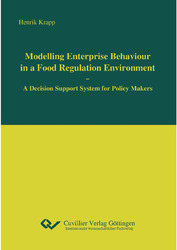| Departments | |
|---|---|
| Book Series (97) |
1382
|
| Nachhaltigkeit |
3
|
| Gesundheitswesen |
1
|
| Humanities |
2379
|
| Medienwissenschaften | 16 |
| Theology | 57 |
| Philosophy | 102 |
| Law | 424 |
| Economics | 856 |
| Social sciences | 418 |
| Sports science | 48 |
| Psychology | 233 |
| Educational science | 190 |
| History | 183 |
| Art | 111 |
| Cultural studies | 167 |
| Literary studies | 117 |
| Linguistics | 89 |
| Natural Sciences |
5409
|
| Engineering |
1798
|
| Common |
97
|
|
Leitlinien Unfallchirurgie
5. Auflage bestellen |
|
Advanced Search
Modelling Enterprise Behaviour in a Food Regulation Environment (English shop)
A Decision Support System for Policy Makers
Henrik Krapp (Author)Preview
Table of Contents, Datei (47 KB)
Extract, Datei (120 KB)
Regulatory frameworks are a common tool in the EU food policy to achieve objectives on the society level, e.g. an increase in the society’s health status. Analyses of potential consequences of regulatory frameworks are a basis for policy makers deciding on their implementation. To support policy decision making the thesis builds on an ex-ante approach considering the development path from a regulation via enterprises’ behaviour to society consequences. Limiting the thesis’ focus on modelling the enterprise behaviour towards regulations its objective is to generate a step-by-step approach for regulatory decision support in food policy and to transform this approach into a computer-based interactive system.
After a theoretical background the thesis presents a basis of an argumentation line that should lead to the requested results, i.e. the enterprise compliance behaviour. This hypothesis is specified and validated according to a decision scenario defined by two regulatory frameworks. A step-by-step approach for regulatory decision support is generated composed of two knowledge areas. (1) A sequence of arguments relying on expertise, and (2) a knowledge base backing up the arguments with modular data, relying on various sources. Of importance for decision aiding is transparency improvement and complexity reduction which is considered by the step-by-step procedure and the filter concept of each argument reducing the model scope.
The utilization of the step-by-step approach through field tests in the cereals industry of several EU countries approved the desired outcome and identified improvement potential. The improved model is translated into a decision support system. The user interface supports the utilization of the model by guiding the interaction between the sequence of arguments, the knowledge base, and the analyst, who has to make the specifications necessary to go from one step to the next. The decision support system presents to the policy maker the status quo of the compliance level, the potential increase through the regulatory framework and the lack in compliance based on the estimated behaviour of affected enterprise classes. The transparency of the system enables recommendations of specific changes in the regulatory framework or corrective policy actions.
| ISBN-13 (Printausgabe) | 3869559888 |
| ISBN-13 (Hard Copy) | 9783869559889 |
| ISBN-13 (eBook) | 9783736939882 |
| Final Book Format | A5 |
| Language | English |
| Page Number | 195 |
| Lamination of Cover | matt |
| Edition | 1 Aufl. |
| Volume | 0 |
| Publication Place | Göttingen |
| Place of Dissertation | Bonn |
| Publication Date | 2012-01-12 |
| General Categorization | Dissertation |
| Departments |
Economics
Agricultural science |








